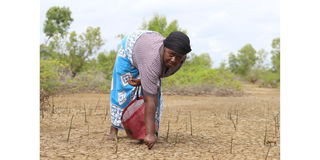Harvest of mangroves a danger to the environment, says AKF

Dar es Salaam. The destruction of nature along the beaches has caused economic and social effects for the residents of Bagamoyo, but thanks to the Aga Khan Foundation (AKF), now they are working to fix things.
A member of the statistics and environmental information committee of Kisutu ward, Seif Ramadhan Seif, said the arbitrary harvesting of mangroves, apart from causing soil erosion, has also affected fishing activities.
"In the past, when it was raining here, we used to catch fish, but now we have to go further; turtle fishermen in these areas are complaining that the fish species have decreased," he says.
He says that when the mangroves were not affected, the fishermen used to harvest 10 to 20 kilos of turtles, but now the maximum they can get is five kilos.
Seif said soil erosion on Kisutu beaches has increased because the sea water has no barrier.
Ali Chaligha, who is the first-level forestry officer at the Forestry Agency (TFS), said the effects of the destruction of mangroves that is taking place include climate change, which causes drought.
"With climate change, there is a big ecological impact. There are some fish these days that are not found in these nearby areas, but also Ceriops tagal trees have been lost because they are harvested indiscriminately," he says.
He says there are many types of mangroves, but Ceriops tagal is being destroyed the most, so even its existence is in danger.
Aga Khan Foundation (AKF) Project Officer Gega Bujeje said that, recognizing the importance of mangroves in environmental conservation and ecology in general, the Foundation started a campaign to restore mangroves.
"Since we started this campaign, we have planted more than 200,000 mangrove trees, and today here in Kingani ward we have planted 55,200 mangroves. We are doing this to take care of the environment, deal with the changes in the country, and enable living things to survive," says Bujeje.
On May 19 this year, AKF launched its campaign to restore nature, aiming to plant 1.5 million mangrove trees on the coast of the Indian Ocean.





